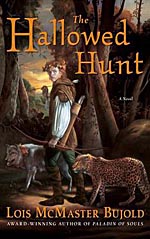
![]() nightxade
nightxade
5/8/2014
![]()
When I stepped into the world of Chalion, I was introduced to its five gods—Father, Son, Mother, Daughter and the Bastard—and some of the rituals surrounding them, but I mistakenly assumed these gods were much like ours: believed in by some, but with little proof of their existence. But as with everything else in The Curse of Chalion, Bujold politely allowed me my assumptions, then gently pulled the rug out from under me and moved on before I even had time to catch my breath. Subsequently, I leapt into the second book, Paladin of Souls, eager to learn more about her world and her gods, and soon fell in love with the Bastard himself. I grabbed Hallowed Hunt hoping for more of the same, but while this did offer more insight into the supernatural and a new form of possession, that of spirit animals, the story and characters themselves were disappointing.
The story begins with the death of a prince, murdered in self-defense by the woman he meant to rape. Ijada is less concerned about her fate before judges who are unlikely to see her side of the story, than she is about the sorcery that the prince had involved, resulting in her acquiring the spirit of a leopard. She is to be delivered to her trial by Ingray, the gruff and deadly sword of a noble lord, who happens to possess an animal spirit of his own. He came by his wolf under traumatic means, but has since suppressed the creature, despite its strength. Their journey together quickly leads them to the realization that their spirits are some how bound together, and they must unravel the mystery.
After Paladin of Souls, where the character of Ista became my new hero, I apparently set my standards too high for Ijada. Not that Ijada wasn't a good character. As usual, I am impressed with the way Bujold handles her women within a male patriarchal society. Her women are all aware of the inequality and may comment on it, but they aren't desperately raging against it. They all overcome or out-manoeuver within the rules, and they all show an consistence strength of will and an inspirational endurance. As this is told entirely through Ingray's point of view, you don't get much from Ijada beyond his views of her stoicism and his disbelief in her willingness to accept him so easily when most people are intimidated by his harsh demeanour.
It's obvious early on that Ijada and Ingray are meant to be together and, despite a few obstacles, that progresses more or less as expected. Bujold's books often involve romances with unusual attractions, but the pairings are usually much more interesting and the build up to the realization that the one has feelings for the other is usually far more subtle.
I didn't enjoy these characters and therefore did not become invested in them or in the story itself. By the time things were revealed and proceeded on to the epic not-quite-showdown and ghostly turn of events, I was rather bored.
However, I did enjoy the insight into demon possession, which mostly came through an encounter with a pregnant sorceress. Since demon possession and the subsequent sorcery status had negative connotations for the people in Paladin of Souls, it was interesting to see the counter view, since this takes place in another land where sorcerers are respected and their abilities are trained.
http://bibliosanctum.blogspot.com